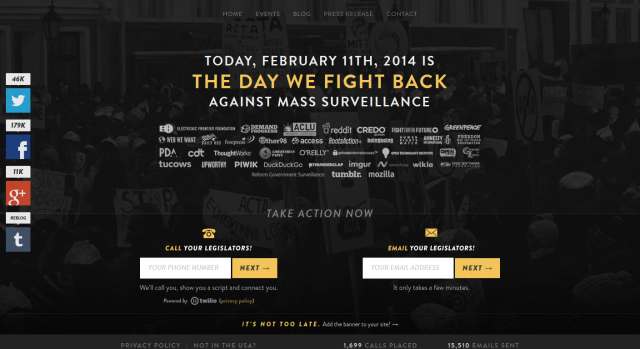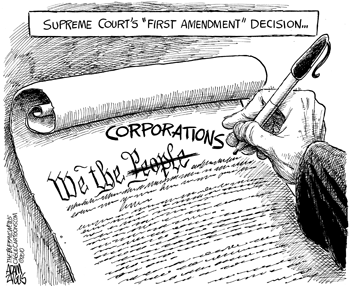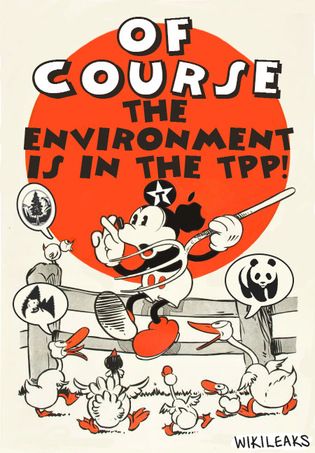Cross posted from The Stars Hollow Gazette
 The bill to fast track the controversial Trans-Pacific Partnership Agreement was introduced last week
The bill to fast track the controversial Trans-Pacific Partnership Agreement was introduced last week
House Ways and Means Committee Chair Dave Camp (R) and top Senate Finance Committee members Max Baucus (D) and Orrin Hatch (R) on Thursday unveiled the Trade Priorities Act of 2014 that would require a simple up-or-down vote on major trade deals without the opportunity to offer amendments to pertinent bills. [..]
The Obama administration is seeking the heightened authority in trade deals, allowing the Executive Branch to smooth congressional negotiations on accords. The two major deals, both long in the works, that are likely to be subject to such legislation are the 12-nation Trans-Pacific Partnership (TPP) and the 28-nation pact with the European Union, the Trans-Atlantic Free Trade Agreement (TAFTA). The deals would establish the world’s largest so-called free-trade zones.
The US is also working on a services-trade accord with a group of nations that would encompass half of the global economy. [..]
The bill has been negotiated in secret and other than some leaked passages by WikiLeaks, only the negotiators and insider corporations have seen the full proposal which is nearing completion. There is push back in the House of Representatives that may scuttle the president’s plan to push this agreement without any debate or amendments
Late last year, 151 House Democrats signed a letter opposing the so-called fast track scheme, also known as trade promotion authority. Several House Republicans oppose fast track on the grounds that it excessively empowers the executive branch, but many others, including Speaker John Boehner (R-Ohio), support the proposal.
“Obama wants to pass it; Democrats in the House want to oppose it,” said one House Democratic aide, who was granted anonymity due to the sensitivity of the Democratic position. “Republicans are split ideologically, and want to know why they should take one for Obama.”
Nevertheless, Boehner said at a Thursday press conference that he cannot pass the bill without Democratic help. [..]
Many House Democrats are flatly opposed to the TPP and efforts to ease its passage. House Democrats are often more responsive to liberal interest groups than their Senate counterparts, and many members — including some in the Democratic Party leadership — believe that opposing TPP is good for electoral politics in 2014. While supporters of the deal argue it will increase economic growth, similar recent trade deals have undercut some U.S. industries and weakened global labor protections.
“The president has failed to find someone who is willing to introduce the bill. He’s got over 200 members to cultivate from, some of whom would like to have his support in the next election. But Democratic members are extremely skeptical of this,” Rep. Alan Grayson (D-Fla.) told HuffPost.
“We’ve tried free trade, and not only has free trade not improved the U.S. economy, it’s gutted manufacturing and driven down our labor standards,” he added, citing NAFTA as a prime example. [..]
Progressive groups came out strongly against the trade promotion authority, suggesting that approving it and the underlying trade deal would undercut efforts to curtail income inequality.
“The Trans-Pacific Partnership would be an unmitigated disaster for everything from the environment to Internet freedom and working families,” said Charles Chamberlain, the executive director of Democracy For America, a grassroots progressive organization, which intends to make trade an election-year issue.
In an interview with Huffington Post, political theorist and linguist Noam Chomsky slammed the agreement as a “neo-liberal assault”
(T)he deal, which is not yet finalized, is “designed to carry forward the neoliberal project to maximize profit and domination, and to set the working people in the world in competition with one another so as to lower wages to increase insecurity.”
Chomsky said it was “a joke” that the deal is designated a “free trade” agreement. “It’s called free trade, but that’s just a joke,” Chomsky said. “These are extreme, highly protectionist measures designed to undermine freedom of trade. In fact, much of what’s leaked about the TPP indicates that it’s not about trade at all, it’s about investor rights.”
The MIT professor also slammed the veil of secrecy that has surrounded TPP negotiations. [..]
As Chomsky noted:
“It’s very hard to make anything of the TPP because it’s been kept very secret. A half-secret, I should say. It’s not secret from the hundreds of corporate lawyers and lobbyists who are writing the legislation. To them, it’s perfectly public. They’re, in fact, writing it. It’s being kept secret from the population. Which of course raises obvious questions.”
If you haven’t done it need to tell our representatives to stop the “fast track” of the TPP. Even if you have do it again. Don’t Let Congress Fast-Track TPP.




 In January 2012 we defeated the SOPA and PIPA censorship legislation with the largest Internet protest in history. A year ago this month one of that movement’s leaders, Aaron Swartz, tragically passed away.
In January 2012 we defeated the SOPA and PIPA censorship legislation with the largest Internet protest in history. A year ago this month one of that movement’s leaders, Aaron Swartz, tragically passed away. It has been four years since the Supreme Court handed down it ruling in
It has been four years since the Supreme Court handed down it ruling in 
 The bill to fast track the controversial Trans-Pacific Partnership Agreement was
The bill to fast track the controversial Trans-Pacific Partnership Agreement was